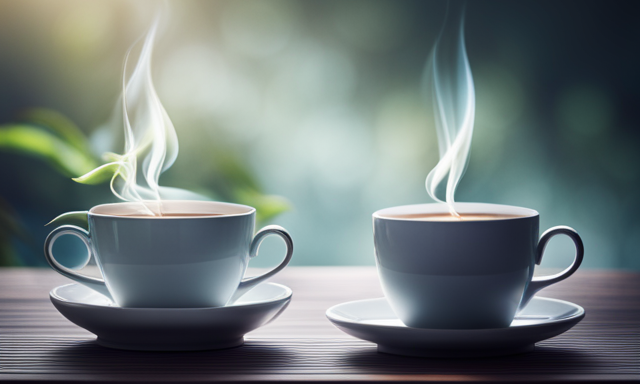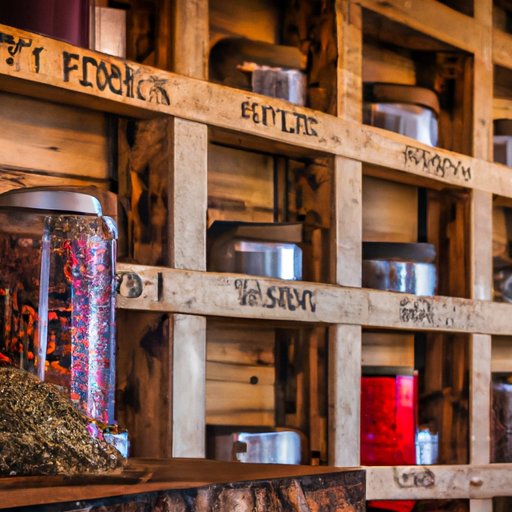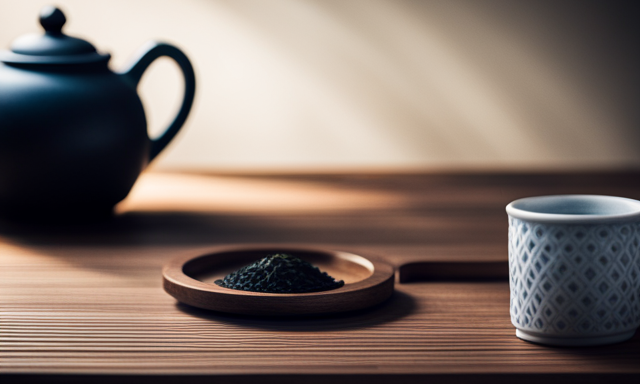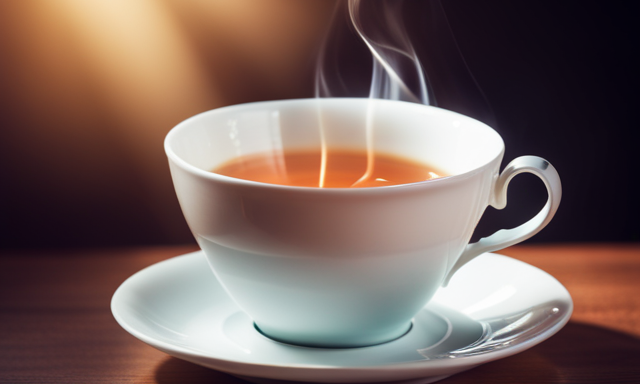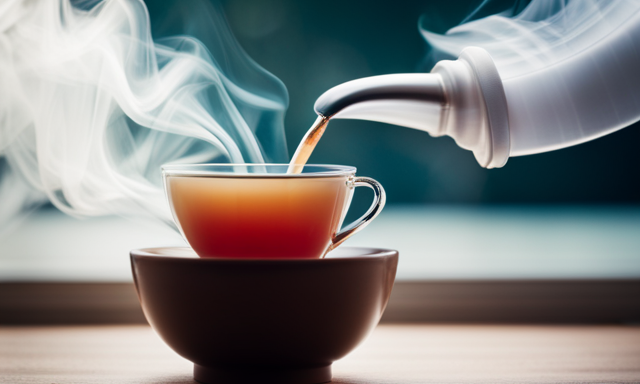Have you ever wondered which tea has less caffeine: green tea or oolong? Well, the answer might surprise you. In this article, I will explore the caffeine content in both green tea and oolong tea and provide evidence-based information to help you make an informed decision.
When it comes to caffeine levels, green tea is often touted as a healthier alternative to coffee. But does that mean it has less caffeine than oolong tea? We’ll find out.
Not only will we delve into the caffeine content, but we will also explore the health benefits and taste profiles of both teas. By the end of this article, you’ll have a clearer understanding of which tea is right for you.
So, grab a cup of tea and let’s get started on this caffeine-filled journey.
Key Takeaways
- Green tea generally has less caffeine than oolong tea.
- The caffeine content in green tea ranges from 20-45 mg per 8-ounce cup, while oolong tea has a caffeine content of 30-50 mg per cup.
- Green tea contains about half the amount of caffeine compared to coffee.
- Choosing between green tea and oolong tea depends on caffeine content and taste preferences.
Understanding Caffeine Content in Tea
If you’re looking to understand the caffeine content in tea, let me tell you that green tea generally has less caffeine than oolong tea. Caffeine levels in tea vary depending on the type of tea leaves used and the brewing method.
While black tea typically contains the highest amount of caffeine among all types of tea, herbal teas are usually caffeine-free. Green tea falls somewhere in between, with lower caffeine content compared to black tea but slightly higher than herbal teas. The caffeine content in green tea can range from 20-45 milligrams per 8-ounce cup. This moderate caffeine content makes green tea a popular choice for those seeking a milder boost without the jitters.
Now let’s dive deeper into the caffeine levels in green tea.
Caffeine Levels in Green Tea
Although green tea is known for its health benefits, it typically contains around half the amount of caffeine compared to a cup of coffee. Understanding caffeine metabolism is important as it helps us comprehend the impact of caffeine on sleep patterns. To give you a clear picture, here is a table comparing the caffeine content in different beverages:
| Beverage | Caffeine Content (mg) |
|---|---|
| Green Tea | 20-45 |
| Coffee | 95-200 |
| Black Tea | 40-70 |
| Oolong Tea | 30-50 |
| Energy Drinks | 70-200 |
As you can see, green tea falls on the lower end of the caffeine spectrum. This makes it a suitable option for those who are sensitive to caffeine or who want to reduce their overall intake. Now let’s delve into the caffeine levels in oolong tea.
Caffeine Levels in Oolong Tea
Oolong tea offers a delightful alternative for those seeking a flavorful beverage with a moderate caffeine content. When it comes to caffeine levels, oolong tea falls between green tea and black tea.
Here are three important factors to consider:
-
Caffeine Effects: Oolong tea contains less caffeine than black tea but more than green tea. This makes it a suitable choice for those who want a gentle energy boost without the jitters.
-
Brewing Methods: The caffeine content in oolong tea can vary depending on the brewing method. Steeping oolong tea leaves for a shorter time or using lower water temperature can help reduce the caffeine level.
-
Taste and Aroma: Oolong tea has a unique flavor profile, offering a balance between the grassy taste of green tea and the boldness of black tea. It has a pleasant floral aroma that adds to its appeal.
Transitioning to the subsequent section about the health benefits of green tea, it’s essential to explore its various advantages beyond just caffeine content.
Health Benefits of Green Tea
Transitioning to the health benefits of green tea, let’s uncover the array of advantages this rejuvenating beverage brings to the table.
Green tea, known for its lower caffeine content compared to coffee, offers numerous health benefits. It’s packed with antioxidants, helping boost the immune system and fight against free radicals. This reduces the risk of chronic diseases like heart disease and certain types of cancers.
Additionally, green tea has been shown to improve brain function, increase fat burning, and promote weight loss. It also contains compounds that can lower the risk of developing type 2 diabetes and improve insulin sensitivity.
Furthermore, green tea has been linked to a reduced risk of stroke and a lower likelihood of developing Alzheimer’s and Parkinson’s diseases.
Moving forward, let’s explore the health benefits of oolong tea.
Health Benefits of Oolong Tea
With its enticing aroma and rich flavor, sipping on a cup of oolong tea is like taking a sensory journey to a tranquil tea garden. Oolong tea is known for its partially fermented leaves and offers a range of health benefits similar to black tea. Here are three reasons why oolong tea is worth incorporating into your routine:
-
Antioxidant powerhouse: Oolong tea is packed with antioxidants, which help combat free radicals and reduce the risk of chronic diseases.
-
Weight management support: Studies suggest that oolong tea may help boost metabolism and promote weight loss by enhancing fat burning.
-
Heart health promoter: Oolong tea has been linked to improved heart health, including lower cholesterol levels and a reduced risk of heart disease.
Now, let’s transition into comparing caffeine levels in green tea and oolong tea.
Comparing Caffeine Levels in Green Tea and Oolong Tea
Now that we have explored the health benefits of Oolong tea, let’s compare the caffeine levels in green tea and Oolong tea. Understanding caffeine metabolism is crucial when making choices about our daily beverage consumption. Green tea and Oolong tea both contain caffeine, but the levels can vary. To help you visualize the caffeine content, here is a table that compares the average caffeine levels in an 8-ounce cup of green tea and Oolong tea:
| Tea Type | Average Caffeine Level (mg) |
|---|---|
| Green Tea | 35-45 |
| Oolong Tea | 37-55 |
While both teas have similar caffeine levels, it is important to note that individual reactions to caffeine can vary. Some potential side effects of consuming too much caffeine include increased heart rate, anxiety, and trouble sleeping. Now that we understand the caffeine differences between green tea and Oolong tea, let’s explore the taste and flavor profiles of green tea.
Taste and Flavor Profiles of Green Tea
Get ready to savor the delightful taste and unique flavor profiles that green tea offers. Green tea is known for its refreshing and grassy flavor, with some variations depending on the type of green tea you choose.
From the classic and widely consumed Chinese green tea to the slightly nutty Japanese sencha or the delicate and floral jasmine green tea, there is a green tea to suit every palate. Compared to black tea, green tea generally has a lighter and more delicate taste, with less bitterness. It’s often described as having a vegetal or seaweed-like quality.
Now, let’s transition into discussing the taste and flavor profiles of oolong tea, another popular tea variety.
Taste and Flavor Profiles of Oolong Tea
Explore the tantalizing range of flavors found in oolong tea, from the rich and earthy notes of a roasted Tie Guan Yin to the fruity and floral undertones of a high mountain Taiwanese oolong like Dong Ding.
Oolong tea offers a diverse taste profile that caters to various taste preferences. Whether you enjoy a bold and robust brew or prefer a lighter, more delicate cup, oolong tea has something to offer.
To enhance the flavor of oolong tea, different brewing techniques can be employed. For a stronger taste, steep the leaves for a longer duration, while a shorter steeping time will yield a milder flavor. Additionally, adjusting the water temperature can also impact the taste.
With these taste preferences and brewing techniques in mind, it’s time to make a decision: green tea or oolong tea?
Making a Decision: Green Tea or Oolong Tea?
Deciding between the invigorating essence of green tea and the tantalizing flavors of oolong tea is a truly delightful dilemma. When choosing between these two teas, it’s important to consider the caffeine content. Green tea generally contains less caffeine than black tea, but the caffeine levels can vary depending on factors such as the brewing time and temperature. On the other hand, oolong tea falls somewhere in between green tea and black tea in terms of caffeine content. It offers a moderate caffeine boost, making it a great option for those looking for a balanced energy boost without the jitters. Ultimately, the choice between green tea and oolong tea comes down to personal preference and the desired effects. In the next section, we will explore the factors to consider when making this decision. So, let’s move on to finding the perfect tea for you.
Conclusion: Finding the Perfect Tea for You
To truly find the tea that perfectly suits your taste and desired effects, reflect on what ignites your senses and indulge in the rich world of tea. Here’s how you can enhance your tea experience:
-
Brewing Method: Experiment with different brewing methods to find the one that brings out the best flavors in your chosen tea. Adjust variables like water temperature and steeping time to make a significant difference in taste and aroma.
-
Exploring Other Herbal Teas: If you’re looking for a caffeine-free option, consider exploring the vast array of herbal teas available. From calming chamomile to invigorating peppermint, there’s a herbal tea for every mood and occasion.
By finding the right brewing method and exploring other caffeine-free herbal teas, you can expand your tea repertoire and discover new flavors that resonate with your personal preferences. So go ahead, immerse yourself in the world of tea and embark on a delightful journey of taste and tranquility.
Frequently Asked Questions
Can green tea or oolong tea help with weight loss?
Green tea and oolong tea both offer weight loss benefits. Green tea boosts metabolism and fat oxidation, while oolong tea promotes fat burning and calorie expenditure. Incorporating either into your routine can support your weight loss goals.
Are there any negative side effects of consuming green tea or oolong tea?
There are potential negative side effects of consuming green tea, such as insomnia, stomach upset, and liver damage. Similarly, consuming oolong tea can lead to digestive problems and has been associated with kidney stones.
Can green tea or oolong tea help improve mental alertness and focus?
Green tea and oolong tea are known for their anxiety relief and cognitive function improvement. They can help boost mental alertness and focus. Incorporating them into your routine may provide a natural boost without the jitters.
How does the caffeine content in green tea and oolong tea compare to coffee?
Caffeine in green tea and oolong tea is generally lower than coffee, but it still affects sleep quality. To minimize caffeine intake, opt for shorter brewing times and lower temperature water when preparing both teas.
Can green tea or oolong tea help reduce the risk of certain diseases, such as heart disease or cancer?
Green tea and oolong tea have been shown to have antioxidant properties, which may help reduce the risk of certain diseases like heart disease and cancer. Additionally, they can act as stress relievers.
Conclusion
After carefully considering the caffeine content, health benefits, and taste profiles of both green tea and oolong tea, it’s clear that the decision ultimately comes down to personal preference. Both teas offer unique advantages and can be enjoyed as part of a balanced and healthy lifestyle.
So, whether you’re looking for a gentle energy boost or a soothing and flavorful experience, both green tea and oolong tea have something to offer. So go ahead, explore and discover the perfect tea that suits your individual taste and needs!

